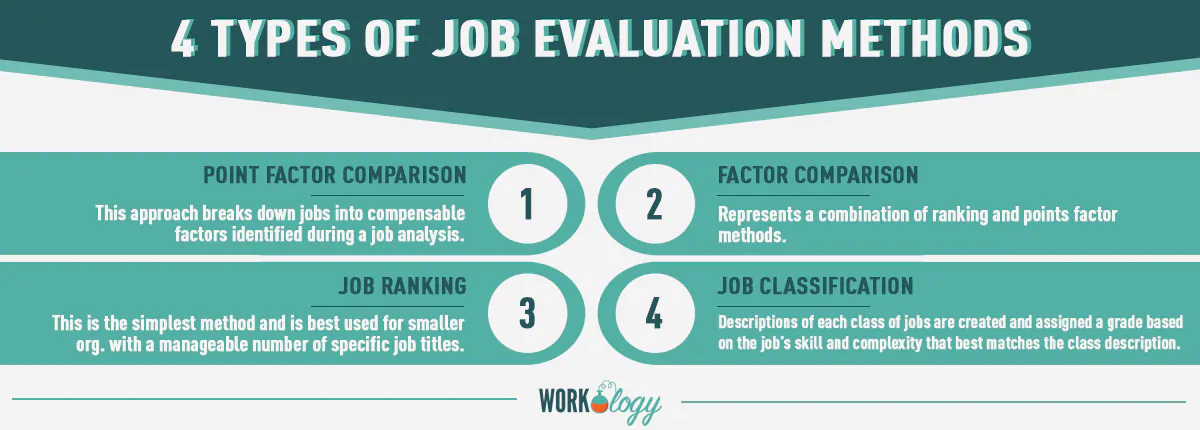
What are the 4 types of evaluation
The main types of evaluation are process, impact, outcome and summative evaluation. Before you are able to measure the effectiveness of your project, you need to determine if the project is being run as intended and if it is reaching the intended audience.
What are the 4 types of evaluation in education
Placement, Formative, Diagnostic, and Summative Evaluation of Classroom Learning.
What are evaluation methods
Evaluation methods usually consist of procedures and protocols that ensure systemisation and consistency in the way evaluations are undertaken. Methods may focus on the collection or analysis of information and data; may be quantitative or qualitative; and may attempt to describe, explain, predict or inform actions.
What are the evaluation methods examples
Some of the evaluation methods which are quite popular are input measurement, output or performance measurement, impact or outcomes assessment, quality assessment, process evaluation, benchmarking, standards, cost analysis, organizational effectiveness, program evaluation methods, and LIS-centered methods.
What are 3 evaluation methods
Evaluation MethodsQuantitative Methods.Qualitative Methods.Mixed Methods.
What are the 5 models of evaluation
What are training evaluation modelsThe Kirkpatrick Model.The CIRO Model.The Phillips ROI Model.The Brinkerhoff model.Kaufman's Model of Learning Evaluation.Anderson Model of Learning Evaluation.
What are two methods of evaluation
Evaluation MethodsQuantitative Methods.Qualitative Methods.Mixed Methods.
What are the 2 basic types of evaluation
Evaluation strategies can be classified into two primary types depending on the information needed – Formative and Summative – and each can play important roles in our efforts to evaluate community engagement.
What are the 5 basic components of evaluation
Evaluation Phases and ProcessesPlanning.Implementation — Formative and Process Evaluation.Completion — Summative, Outcome, and Impact Evaluation.Dissemination and Reporting.
What are the 3 evaluation models and methods
The three main types of evaluation methods are goal-based, process-based and outcomes-based. Goal-based evaluations measure if objectives have been achieved (We highly recommend S.M.A.R.T. Goals). Process-based evaluations analyze strengths and weaknesses.
What are 3 basic evaluation activities
Strategy evaluation includes three basic activities: (1) examining the underlying bases of a firm's strategy, (2) comparing expected results with actual results, and (3) taking corrective actions to ensure that performance conforms to plans.
What are the three levels of evaluation
The four levels of evaluation are: (1) the reaction of the student and their thoughts about the training experience; (2) the student's resulting learning and increase in knowledge from the training experience; (3) the student's behavioral change and improvement after applying the skills on the job; and (4) the results …
What are the three steps of evaluation
See also the Toolkit for Evaluating Interventions on Preventing and Countering Crime and Terrorism; Brief (2-pager).STEP 1: PLANNING FOR EVALUATION AT THE DESIGN STAGE OR REVISION OF A PROJECT/PROGRAMME.STEP 2: PREPARATION FOR AN EVALUATION.STEP 3: CONDUCT OF AN EVALUATION.
What are the 5 steps of evaluation
5 Steps to a Performance Evaluation SystemDevelop an evaluation form.Identify performance measures.Set guidelines for feedback.Create disciplinary and termination procedures.Set an evaluation schedule.
What are the two 2 basic types of evaluation
Evaluation strategies can be classified into two primary types depending on the information needed – Formative and Summative – and each can play important roles in our efforts to evaluate community engagement.
What are the names of the 3 modes of evaluation
The three types of evaluation are:Formative Evaluation.Summative Evaluation.Diagnostic Evaluation.
What are the 6 steps of evaluation approach
Figure 1: The Six Basic Steps of EvaluationStep 1: Understand the evaluation design.Step 2: Identify the evaluation questions.Step 3: Establish cooperative agreements.Step 4: Sample cases and collect your data.Step 5: Analyze your data.Step 6: Interpret your results.
What are the 7 steps of performance evaluation process
1 Manager Checks the Plan.2 Employee Self Evaluates.3 Manager Evaluates Employee.4 Reviewing Manager + HR Review.5 1:1 Meeting (Manager and Employee)6 Employee Acknowledges Review.7 Manager Completes Evaluation.
What are the three common evaluation methods
The three main types of evaluation methods are goal-based, process-based and outcomes-based. Goal-based evaluations measure if objectives have been achieved (We highly recommend S.M.A.R.T. Goals). Process-based evaluations analyze strengths and weaknesses.
What are any two techniques of evaluation
Techniques of Evaluation (मूल्यांकन की तकनीक)Self Reporting (स्वयं रिपोर्टिंग)Testing (परीक्षण)Observation (अवलोकन)Interview (साक्षात्कार)Case Study (केस स्टडी)Sociometry (समाजमिति)Projective Techniques (प्रोजेक्टिव तकनीक)
What are the 5 principles of evaluation
The five Principles address systematic inquiry, competence, integrity, respect for people, and common good and equity. The Principles are interdependent and interconnected. At times, they might even conflict with one another. Therefore, evaluators should carefully examine how they justify professional actions.
What are the two stages of evaluation
Evaluation Phases and ProcessesPlanning.Implementation — Formative and Process Evaluation.Completion — Summative, Outcome, and Impact Evaluation.Dissemination and Reporting.
What are the top 6 evaluation criteria
Evaluation CriteriaRELEVANCE is the intervention doing the right thingsCOHERENCE how well does the intervention fitEFFECTIVENESS is the intervention achieving its objectivesEFFICIENCY how well are resources being usedIMPACT what difference does the intervention makeSUSTAINABILITY will the benefits last
What are the 5 evaluation criteria for evaluation
Evaluation CriteriaRELEVANCE is the intervention doing the right thingsCOHERENCE how well does the intervention fitEFFECTIVENESS is the intervention achieving its objectivesEFFICIENCY how well are resources being usedIMPACT what difference does the intervention makeSUSTAINABILITY will the benefits last


